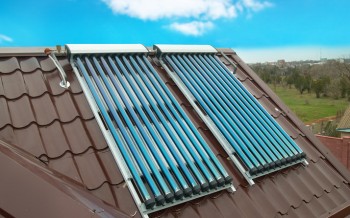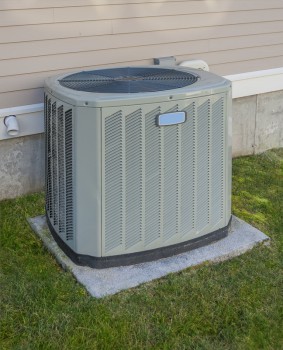When selecting a pool heating system, a lot depends on your relationship with your pool, and your relationship with your wallet. For the lowdown on the costs of pool heating, read on.
There are 3 most common systems, each with different associated pool heating costs. These are:
- Solar Pool Heaters
- Gas Heaters
- Electric Heat Pumps
But which one is best for you? What are the benefits and drawbacks of each? And how much do they cost?
[cta id=”2833″ vid=”0″]
Article Contents
Solar Pool Water Heating

How Much Does Solar Cost to Buy and Install?
Depending on the size of your pool, basic systems range from around $1,000 to around $5,000. Again, depending on the size of your pool, installation costs generally range from between $600 to around $2,500.
In general, for a typical 8m x 4m pool, a solar heating system is likely to cost around $2,500 and the installation another $1,250 – $1,350; a total fully installed cost of around $3,800.
How Much Does Solar Cost to Run?
Here’s the good news: almost nothing. The running costs are limited to the energy costs necessary for running the pool pump. At an average of around $0.23 per KW hour, this should work out at around, or less than, $1.00 per day.
Benefits of Solar Pool Heating
- Free Energy. The great thing about solar heaters is that they run off free energy provided by the sun. So, after the initial up-front costs of purchase and installation, their running costs are relatively negligible – typically less than a dollar a day, that being the energy cost it takes to power the booster pump.
- Green Energy. Solar heating is the environmentally friendly and natural way to heat your pool.
- Running Costs. Once installed, there are virtually no running costs.
Drawbacks of Solar Heating
- Slow Heat Up. Solar systems are capable of warming the pool water temperature by around 5-8ᵒ C, and even by as much as 10ᵒ C. But the process takes time.
- Collector Panel Size. The amount of heat the system generates is directly proportional to the square meterage of the collector relative to that of the pool – as a rule of thumb, the collector should be at least 80% the square meterage of the pool, and preferably 100%.
- Weather Dependant. Solar pool heaters are only as efficient as the amount of direct sunshine they receive. Their heating effect is limited, therefore, by both weather and shade.
Gas Heaters
Gas heaters either burn natural gas or, in areas where natural gas is unavailable, liquid propane gas. The way they work is that gas is burned inside a combustion chamber which contains coils of copper piping. Water from the pool is pumped into the heater and flows through the copper piping, and the heated water then flows back into the pool.
How Much Do Gas Heaters Cost to Buy and Install?
Obviously, the size of the gas pool heater you need will depend on the size of your pool. For an average 32 m2 pool the price is likely to be in the region of $3,000 – $4,000. Installation is pretty straightforward, and typically comes in at around $250.
How Much Do Gas Heaters Cost to Run?
Here’s the catch. Because of their relatively low COPs, annual running costs can be high.
Using natural gas, and assuming 7 months of active pool heating use per year, the cost of gas heating a 32 m2 pool in southern QLD to central/north eastern NSW is likely to be $600-$1,200 per annum. And that’s assuming you’re also using a pool cover; if you’re not using a pool cover, the running costs double.
For LPG, the running costs are higher. On the same assumptions as above, LPG running costs are likely to come in closer to $2,000 per annum. And, as above, without a pool cover, again, the running costs will double.
Benefits of Gas Heaters
- Speed. The main benefit of gas pool heating is that it is fast and reliable. Typically, gas heaters are capable of raising the water temperature of a standard 32 m2 pool by around 14°C in less than 24 hours.
- On Demand Heat. Because of the speed at which they heat the water, gas heaters provide the convenience of on demand heating. If you’ve got friends and family coming round for a barbecue, just turn on the heater the night before.
- Year Round Swimming. Gas heaters operate efficiently even in the winter months, thereby providing the ability to use your pool all years round.
Drawbacks of Gas Heaters
- Inefficient. Gas heaters are inefficient users of energy, and generally only produce around 0.80 to 0.85 kw of heat for every 1 kw of energy they consume. (This is known as the ‘coefficient of performance’, or COP – a heater that requires 1 kw energy to produce 0.80 kw of heat has a COP of 0.80.)
- Running Costs. Because of their relatively inefficient use of energy, gas heaters can have the highest running costs of any type of pool heater.
Electric Heat Pumps

How Much Do Electric Heat Pumps Cost to Buy and Install?
Electric heat pumps aren’t exactly cheap. Prices vary depending on the size of the heat pump. For a standard 32 m2 pool, prices range from $4,500-$6,000. Installation is not overly complicated, and likely to cost in the region of $400.
How Much Do Electric Heat Pumps Cost to Run?
Electric heat pumps are staggeringly efficient users of energy, and actually produce far more energy than they consume. For every 1 kw of power they consume, they produce 5kw of heat. As a result their running costs are relatively low.
Assuming 7 months of active pool heating use per year, the cost of gas heating a 32 m2 pool in southern QLD to central/north eastern NSW is likely to be $400-$600 per annum – presuming that you’re using a pool cover. Without a pool cover, running costs are likely to double.
Benefits
- Energy Efficiency. For every 1 kw of power they consume, they produce 5 kw of heat.
- Low Running Costs. Because they’re so energy efficient,running costs are relatively low; though not as low as solar heating.
- Relatively Fast. Although not as fast as a gas heater, electric heat pumps will heat the pool considerably more quickly than solar heaters. In general, for a standard 32 m2 pool, a pool heat pump will take 48-72 hours to raise the water temperature by 14°C.
Drawbacks
- High Purchase Price. Generally more than twice the price of either solar or gas heaters.
- Ambient Air Temperature. Although most electric heat pumps will operate efficiently even in air temperatures as low as 7°C, below that there is a risk of ice forming on their condensers thereby causing mechanical failure.
Summary Table of Costs
| System | Price | Installation Cost | Running Cost | 10 Year Average Cost |
| Solar Heating | $2,500 | $1,300 | $150 | $430 |
| Gas Heater Natural Gas |
$3,500 | $250 | $900 | $1,270 |
| Gas Heater LPG | $3,500 | $250 | $2,000 | $2,370 |
| Electric Heat Pump | $5,250 | $400 | $500 | $1,065 |
*7 months active pool use per year, with pool cover, southern QLD to central/north eastern NSW
[cta id=”2833″ vid=”0″]
Related Reading:
Cost of Solar Pool Heating
Solar Pool Heating Vs Heat Pump: Which is Better?
Pool Heating 5 Mistakes Download
15 Ways to Reduce Your Pool Running Costs


I was wondering whether you would have an option to hire a portable heater to heat a swimming pool for a one off winter occasion.
boil your kettle and dump this into the pool or set a fire near it